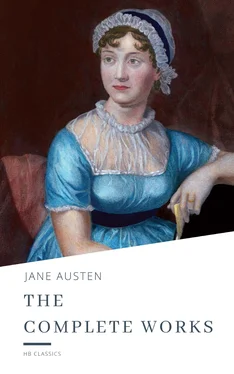"It is a beautiful country," he replied; "but these bottoms must be dirty in winter."
"How can you think of dirt, with such objects before you?"
"Because," replied he, smiling, "among the rest of the objects before me, I see a very dirty lane."
"How strange!" said Marianne to herself as she walked on.
"Have you an agreeable neighbourhood here? Are the Middletons pleasant people?"
"No, not all," answered Marianne; "we could not be more unfortunately situated."
"Marianne," cried her sister, "how can you say so? How can you be so unjust? They are a very respectable family, Mr. Ferrars; and towards us have behaved in the friendliest manner. Have you forgot, Marianne, how many pleasant days we have owed to them?"
"No," said Marianne, in a low voice, "nor how many painful moments."
Elinor took no notice of this; and directing her attention to their visitor, endeavoured to support something like discourse with him, by talking of their present residence, its conveniences, &c. extorting from him occasional questions and remarks. His coldness and reserve mortified her severely; she was vexed and half angry; but resolving to regulate her behaviour to him by the past rather than the present, she avoided every appearance of resentment or displeasure, and treated him as she thought he ought to be treated from the family connection.
Mrs. Dashwood was surprised only for a moment at seeing him; for his coming to Barton was, in her opinion, of all things the most natural. Her joy and expression of regard long outlived her wonder. He received the kindest welcome from her; and shyness, coldness, reserve could not stand against such a reception. They had begun to fail him before he entered the house, and they were quite overcome by the captivating manners of Mrs. Dashwood. Indeed a man could not very well be in love with either of her daughters, without extending the passion to her; and Elinor had the satisfaction of seeing him soon become more like himself. His affections seemed to reanimate towards them all, and his interest in their welfare again became perceptible. He was not in spirits, however; he praised their house, admired its prospect, was attentive, and kind; but still he was not in spirits. The whole family perceived it, and Mrs. Dashwood, attributing it to some want of liberality in his mother, sat down to table indignant against all selfish parents.
"What are Mrs. Ferrars's views for you at present, Edward?" said she, when dinner was over and they had drawn round the fire; "are you still to be a great orator in spite of yourself?"
"No. I hope my mother is now convinced that I have no more talents than inclination for a public life!"
"But how is your fame to be established? for famous you must be to satisfy all your family; and with no inclination for expense, no affection for strangers, no profession, and no assurance, you may find it a difficult matter."
"I shall not attempt it. I have no wish to be distinguished; and have every reason to hope I never shall. Thank Heaven! I cannot be forced into genius and eloquence."
"You have no ambition, I well know. Your wishes are all moderate."
"As moderate as those of the rest of the world, I believe. I wish as well as every body else to be perfectly happy; but, like every body else it must be in my own way. Greatness will not make me so."
"Strange that it would!" cried Marianne. "What have wealth or grandeur to do with happiness?"
"Grandeur has but little," said Elinor, "but wealth has much to do with it."
"Elinor, for shame!" said Marianne, "money can only give happiness where there is nothing else to give it. Beyond a competence, it can afford no real satisfaction, as far as mere self is concerned."
"Perhaps," said Elinor, smiling, "we may come to the same point. YOUR competence and MY wealth are very much alike, I dare say; and without them, as the world goes now, we shall both agree that every kind of external comfort must be wanting. Your ideas are only more noble than mine. Come, what is your competence?"
"About eighteen hundred or two thousand a year; not more than THAT."
Elinor laughed. "TWO thousand a year! ONE is my wealth! I guessed how it would end."
"And yet two thousand a-year is a very moderate income," said Marianne. "A family cannot well be maintained on a smaller. I am sure I am not extravagant in my demands. A proper establishment of servants, a carriage, perhaps two, and hunters, cannot be supported on less."
Elinor smiled again, to hear her sister describing so accurately their future expenses at Combe Magna.
"Hunters!" repeated Edward—"but why must you have hunters? Every body does not hunt."
Marianne coloured as she replied, "But most people do."
"I wish," said Margaret, striking out a novel thought, "that somebody would give us all a large fortune apiece!"
"Oh that they would!" cried Marianne, her eyes sparkling with animation, and her cheeks glowing with the delight of such imaginary happiness.
"We are all unanimous in that wish, I suppose," said Elinor, "in spite of the insufficiency of wealth."
"Oh dear!" cried Margaret, "how happy I should be! I wonder what I should do with it!"
Marianne looked as if she had no doubt on that point.
"I should be puzzled to spend so large a fortune myself," said Mrs. Dashwood, "if my children were all to be rich my help."
"You must begin your improvements on this house," observed Elinor, "and your difficulties will soon vanish."
"What magnificent orders would travel from this family to London," said Edward, "in such an event! What a happy day for booksellers, music-sellers, and print-shops! You, Miss Dashwood, would give a general commission for every new print of merit to be sent you—and as for Marianne, I know her greatness of soul, there would not be music enough in London to content her. And books!—Thomson, Cowper, Scott—she would buy them all over and over again: she would buy up every copy, I believe, to prevent their falling into unworthy hands; and she would have every book that tells her how to admire an old twisted tree. Should not you, Marianne? Forgive me, if I am very saucy. But I was willing to shew you that I had not forgot our old disputes."
"I love to be reminded of the past, Edward—whether it be melancholy or gay, I love to recall it—and you will never offend me by talking of former times. You are very right in supposing how my money would be spent—some of it, at least—my loose cash would certainly be employed in improving my collection of music and books."
"And the bulk of your fortune would be laid out in annuities on the authors or their heirs."
"No, Edward, I should have something else to do with it."
"Perhaps, then, you would bestow it as a reward on that person who wrote the ablest defence of your favourite maxim, that no one can ever be in love more than once in their life—your opinion on that point is unchanged, I presume?"
"Undoubtedly. At my time of life opinions are tolerably fixed. It is not likely that I should now see or hear any thing to change them."
"Marianne is as steadfast as ever, you see," said Elinor, "she is not at all altered."
"She is only grown a little more grave than she was."
"Nay, Edward," said Marianne, "you need not reproach me. You are not very gay yourself."
"Why should you think so!" replied he, with a sigh. "But gaiety never was a part of MY character."
"Nor do I think it a part of Marianne's," said Elinor; "I should hardly call her a lively girl—she is very earnest, very eager in all she does—sometimes talks a great deal and always with animation—but she is not often really merry."
"I believe you are right," he replied, "and yet I have always set her down as a lively girl."
Читать дальше












